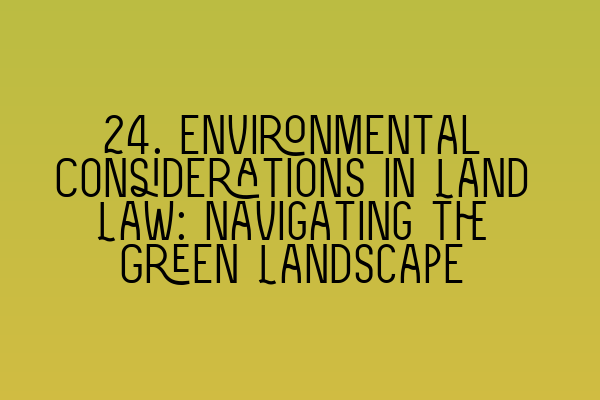24. Environmental Considerations in Land Law: Navigating the Green Landscape
As society becomes more conscious of the impact of human activities on the environment, environmental considerations have increasingly become an important aspect of land law. When dealing with land transactions or development projects, it is crucial for property lawyers to navigate the green landscape and ensure compliance with environmental regulations. In this blog post, we will explore the key environmental considerations in land law and provide insights on how to address them effectively.
1. Environmental Impact Assessments
One of the first steps in evaluating the environmental impact of a proposed development project is conducting an Environmental Impact Assessment (EIA). An EIA assesses the potential environmental effects of a project, considering factors such as air and water pollution, noise pollution, and the impact on flora and fauna.
Property lawyers play a vital role in ensuring that their clients comply with EIA requirements. They need to ensure that the necessary assessments are conducted, and the findings are appropriately addressed and mitigated. By doing so, property lawyers can protect their clients from potential legal disputes and environmental liabilities.
2. Conservation and Protected Areas
In land law, there are various designations for protected areas to preserve the natural environment and biodiversity. These include National Parks, Areas of Outstanding Natural Beauty, and Sites of Special Scientific Interest.
When dealing with land transactions in or near protected areas, property lawyers must be aware of the specific regulations and restrictions that apply. Compliance with these regulations is crucial to avoid legal complications and potential penalties. Additionally, property lawyers can provide advice on any development or alteration proposals within these areas.
By understanding the nuances of protected area regulations, property lawyers demonstrate their expertise and provide valuable guidance to clients. They ensure that their clients are aware of the legal constraints and can make informed decisions about their land transactions or development plans.
3. Pollution Control and Remediation
Pollution control and remediation are essential aspects of environmental considerations in land law. Property lawyers need to advise their clients on regulatory requirements related to pollution prevention and remediation.
In cases where a property has been contaminated by previous industrial activities or other sources, property lawyers can assist in negotiating appropriate clauses in contracts to address the issue. They can advise on the legal responsibilities of both the buyer and the seller and ensure that the necessary assessments and remediation measures are undertaken.
Moreover, property lawyers can help their clients navigate the complex web of environmental regulations related to air and water pollution, hazardous substances, and waste disposal. By providing comprehensive advice on compliance, property lawyers play a crucial role in safeguarding their clients’ interests and ensuring sustainable land management.
4. Climate Change Adaptation
Climate change presents significant challenges for land law and property transactions. It is important for property lawyers to be aware of the potential impacts of climate change on land, such as coastal erosion, flooding, and changing weather patterns.
Property lawyers can assist their clients in understanding the risks associated with climate change and incorporating appropriate adaptation measures into their land transactions or development projects. This may include considering the location’s vulnerability to climate change effects and identifying measures to mitigate these risks.
By providing advice on climate change adaptation, property lawyers ensure that their clients are well-informed and able to make informed decisions that minimize future liabilities and protect the value of their land investments.
Conclusion
Environmental considerations are becoming increasingly important in land law, and property lawyers play a vital role in navigating the green landscape. By understanding and addressing the environmental implications of land transactions and development projects, property lawyers protect their clients from potential legal disputes and environmental liabilities.
At SQE Property Law & Land Law, we have a team of experienced property lawyers who are well-versed in environmental considerations in land law. If you need expert advice on any aspect of property law, including environmental considerations, don’t hesitate to contact us. Our team is here to assist you.
Related Articles:
